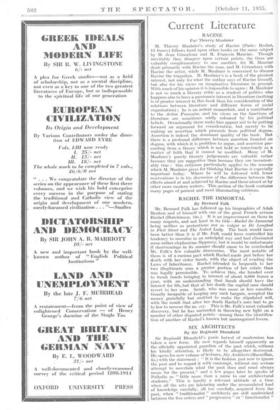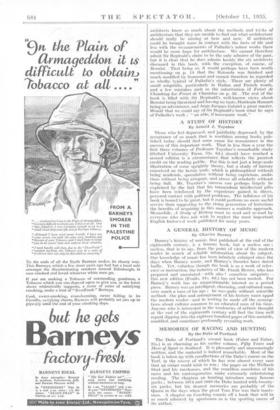SIX ARCHITECTS By Sir Reginald Blomfield Sir Reginald Blornfleld's panic
hatred of modernism has taken a new form. He now regards himself apparently as the officially appointed guardian of the past which, without his kindly attention, is likely to be altogether destroyed. Inc opens his new volume of lectures, Six Architects (Macmillan, Bs.) with the statement : " It is the fashion just now to ignore the past and to regard it with contempt, without any serious attempt to ascertain what the past does and must always mean for the present," and a few pages later he speaks of Palladio as " little more than a name to our architectural students." This is hardly a relevant attitude at a time when all the arts are labouring under the accumulated load of knowledge carefully, all too carefully, acquired from the past, when " traditionalist " architects are still sandwiched between the five orders and " progressive " or " functionalist " architects know so much about- the methods and tucks architecture that they are unable to find out what architecture should really be aiming at here and now: If architectS could be brought more in contact with the facts of life and less with the measurements of Palladio's minor works there would be more hope for architecture. We cannot therefore admit Sir Reginald's claim to be the only admirer of the past, , but it is clear that he does admire keenly the six architects discussed in this book, with the exception, of course, of Bernini. • That being so; it would .perhaps have been worth mentioning on p. 14 that the Rotonda was finished and much modified by Searnozzi and cannot therefore be regarded - as. wholly.; typical of Palladio's style. , There are plenty of , small misprints, particularly in Italian and French words, and a few mistakes such as the Substitution of .Freart de Chambray for FrArt rle Chantelon on p. 59. The rest. of the book is filled with Sir Reginald's well-known views about Bernini being theatrical and having no taste, Haidouin Mansart being an adventurer, and Ante Jacques Gabriel a great master. Would that we eolild say, of Sir Reginald's book what he says of Palladio's work : " an able, if inaccurate work."































































 Previous page
Previous page